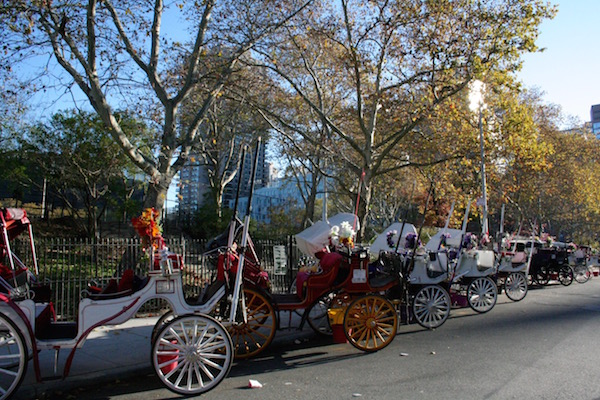
BY JOSH ROGERS | Bill de Blasio had been mayor just over a month when Jon Stewart asked him if banning the Central Park horse carriages would turn out to be his Guantanamo — referring to President Barack Obama’s unfulfilled campaign promise to close the US detention camp there.
The mayor was willing to engage the joke from “The Daily Show” host during that February 2014 appearance, before saying, “Horses do not belong in the middle of traffic in New York City.”
The Daily News, by its own account, “raised a hue and cry” in its campaign to save the carriage industry, and the City Council opposed the mayor’s plan, which looked to be dead until last week, when reports surfaced that the mayor was quietly pursuing a plan to get the horses off city streets by building a stable in Central Park large enough to accommodate about 70 horses, roughly one third of the current number.
De Blasio acknowledged to reporters last week that he was talking to individual Council members about legislation that could pass. The New York Times, which first broke the story, reported that at least three unnamed members spoke to the mayor about the new idea.
Three who appear likely to be part of the group speaking to de Blasio are Councilmembers Dan Garodnick, Ben Kallos, and Corey Johnson. All have previously been reported to be undecided on the issue and have districts that either border the park or are close to it. They and their spokespersons did not return calls seeking comment.
Presumably, the mayor would only float the plan to members who agreed to keep it quiet.
Councilmember Helen Rosenthal, whose district includes the park, sounded a little annoyed that she had not heard from the mayor — but she told Chelsea Now’s sister publication, Manhattan Express, that it is something she potentially could support depending on the details.
She backs an outright ban, and the mayor may be calculating that she and her like-minded colleagues would end up supporting any limit that has more support.
Wiley Norvell, a de Blasio spokesperson, said in a statement, “We continue to work for legislation that represents a humane and equitable solution that moves the horses off our streets, safeguards the animals, and protects the livelihoods of the men and women who provide carriage rides.”
The compromise plan has been ridiculed by the News, the Post, and leaders of the carriage industry. NYCLASS, the advocacy group pushing for a ban, issued a more positive statement last week saying, “We need to see more details, and frankly, we need to see action and not just promises. But we will continue to work with the mayor and city leaders to protect the horses.”
De Blasio’s ride into City Hall two years ago was helped by the carriage opponents, who were the major backers of a PAC that ran ads against Christine Quinn, a carriage industry supporter who began the Democratic mayoral primary race as the clear frontrunner.






























